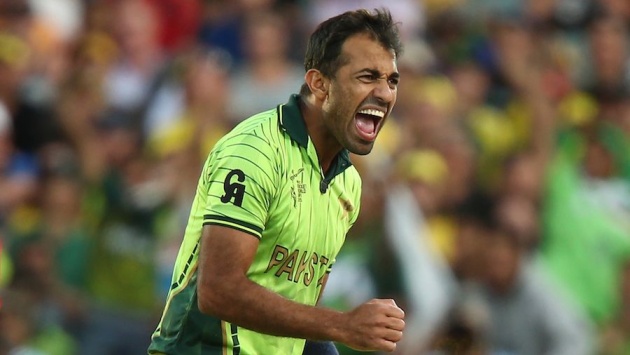Former Pakistan batsman Ramiz Raja has called on the national selectors to appoint fast bowlerWahab Riaz as the country's next one-day captain.

Speaking to ESPNcricinfo, Ramiz said that after watching Wahab bowl in the quarter-final defeat against Australia, he was convinced Wahab can make it "big as a leader" because of the "aggression, passion and emotion" he showed. Pakistan will need to find a replacement forMisbah-ul-Haq, who had announced his retirement from ODIs after the World Cup, and Ramiz urged the selectors to groom a youngster for the job.
"It's a difficult one because Pakistan have not yet trained a youngster," Ramiz said. "What I saw of him (Wahab) against Australia convinces me that he's got it in him to make it big as a leader because he showed aggression, passion and emotion and that is what is required right now to put Pakistan cricket back on track.
"The team think tank have not really been able to give Pakistan that aggressive tag that its renowned for and I've been very disappointed with the route that we have taken. Pakistan cricket is about emotion, about showing passion and to a certain degree about being unpredictable in a healthy way, which makes it so romantic."
Wahab was among the few standout performers for Pakistan at the World Cup, finishing as one of the tournament's highest wicket-takers with 16 scalps at an average of 23.00 and an economy rate of 5.56. His spell to Shane Watson during Australia's run-chase in the quarter-final in Adelaide was an unforgettable passage of play, and Ramiz believed the time was right for Pakistan to pitchfork Wahab at the helm on the back of that performance.
"You can experiment with an out-of-box idea like this in one-day cricket. Australia is a great example," he said. "George Bailey was plucked out of first class cricket straight into international cricket as a leader when he was made T20 captain. I've seen the ingredients to give Wahab Riaz that pedestal and position. Let's see how he operates but what I saw of him against Australia, he can take Pakistan cricket in the right direction."
Although Pakistan won't have the services of Misbah and Shahid Afridi, who too retired after the tournament, Ramiz believes that at least for the short-term, the selectors should consider "looking beyond" players like Ahmed Shehzad, whose best scores came against UAE and Ireland, and Umar Akmal, who produced underwhelming returns at the World Cup. While Shehzad made 227 runs at an average of 32.42 in his seven innings, Akmal could manage just 164 at 27.33.
"I would look beyond these youngsters because you have to get the nucleus right," he said. "You can carry on for a bit with these guys but they need to learn quickly because people are getting frustrated, they must themselves be getting frustrated because they know that they have the talent and ability. I think Pakistan do not have even at this stage a batting culture, like for example India."When you are in and you have got 20 or 30, those numbers then need to get converted to a 60 or a 70 which they fail consistently, not only the youngsters but also the senior players. They also disappointed in that area.
"Pakistan's batting is a throwback to the 1980s. We need to kick on and be a little progressive in our thoughts and a little fearless in our approach, and that seems to be missing. I don't think they are far behind in the bowling area but batting needs a kick up the backside. They need to take a fearless approach and a new direction altogether with the bat."
While Pakistan's batting was a letdown throughout their campaign, Ramiz was impressed with what he saw from the bowlers. Wahab stood out, but in Sohail Khan, Rahat Ali, Mohammad Irfan and Junaid Khan, who was ruled out of the squad due to injury, Pakistan have a strong core group of fast bowlers to call upon.
Ramiz, who played under Imran Khan for a large part of his international career, believes Pakistan need to focus on creating "an aggressive environment" similar to that era for these bowlers to achieve their full potential. He said the country's "great bowling culture" meant that these young fast bowlers did not need to be taught "how to bowl." All they need, according to him, is the backing of the team's leadership group and management.
"I think we have been very conservative in our approach about when to introduce and unleash young bowling talent," Ramiz said. "Our fast bowlers have been far too reserved and it stems from the fact that we have had a reserved captain. It needs to change completely after this World Cup fall and we need to think differently so that these younger players take Pakistan to a newer high."
Ramiz was also of the view that Pakistan needed to follow the example of India who have "moved on" from celebrating past feats, and focus on an "overhaul" of the domestic structure.
"We still rejoice the 1992 World Cup whereas for example, India, our neighbour, has moved on," he said. "They've produced new superstars and Pakistan have lagged behind in that area. They (Pakistan's batsmen) don't seem to read the situation and that stems from the fact that Pakistan domestic cricket needs an overhaul.
"You have to go through such situations at domestic level to make you a success story at international level. Then it doesn't appear to be an alien art for you because I feel some of these younger guys just do not know how to operate in or react to a tense, crunch situation."
Pakistan's next international assignment is a tour of Bangladesh involving two Tests, three ODIs and a T20I from the middle of April.



